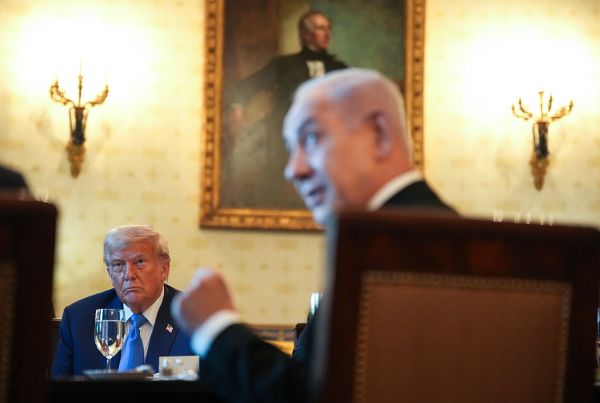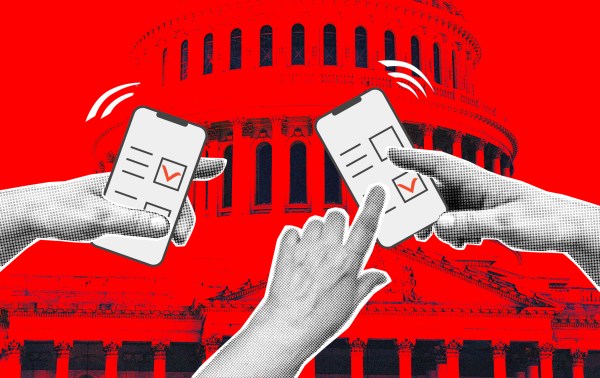A few weeks after starting his second White House term, President Donald Trump welcomed Tucker Carlson and Elon Musk to the Oval Office. Trump’s two key allies, the centibillionaire and the pundit, donned oversized Make America Great Again hats and posed for a photo with the president on a walk outside the West Wing. As the camera snapped, each man was sporting a signature Trumpian thumbs-up, with Carlson seeming to be caught in the middle of his signature cackle.
No one’s laughing now. Less than two weeks after his public and vicious falling out with former special-government employee Musk, Trump is engaging in a war of words with Carlson over the war between Israel and Iran.
Hours after Israel attacked Iran’s nuclear sites on June 13 and killed top Iranian military officials and nuclear scientists, Carlson wrote on his website that Trump was “complicit in the act of war.” He demanded that the U.S. should “drop Israel”—meaning “no funding, no American weapons, no troops on the ground”—because it was not in the U.S. interest.
But Trump has been boasting about the effectiveness of U.S. weapons in Israeli hands, and when Trump was asked by a reporter about Carlson’s claim, he responded by mocking the former Fox News host’s diminished stardom. “I don’t know what Tucker Carlson is saying. Let him go get a television network and say it so that people listen,” he replied. The volley continued later. “Somebody please explain to kooky Tucker Carlson that IRAN CAN NOT HAVE A NUCLEAR WEAPON!” Trump wrote that night on Truth Social. Then later: “AMERICA FIRST means many GREAT things, including the fact that, IRAN CAN NOT HAVE A NUCLEAR WEAPON. MAKE AMERICA GREAT AGAIN!!!”
MAGA figures like Rep. Marjorie Taylor Greene and former White House chief strategist Steve Bannon have backed Carlson’s position on Israel and Iran, but Carlson seems likely to have no more success than Musk in winning over the sentiment of rank-and-file Republicans in his feud with the sitting Republican president. Public polling shows Trump voters overwhelmingly favor U.S. support of Israel and preventing Iran from getting a nuclear weapon. Missouri Sen. Josh Hawley, a reliable barometer of populist sentiment in Congress, is standing behind Trump and Israel. “I think the president has handled this very deftly,” the Republican said of the Iran-Israel conflict when The Dispatch asked him about the Carlson-Trump feud on Tuesday. Hawley, who had spoken by phone to Trump earlier that day, said Trump is “very focused” on the conflict and has been “very consistent” that “Iran’s not gonna get a nuke. That is good for nobody. It’s terrible for us and our security. It’s obviously an existential threat to Israel.”
Carlson isn’t the only neo-isolationist whom Trump has marginalized over the Israel-Iran conflict. Days before the strike, Tulsi Gabbard, Trump’s anti-interventionist director of national intelligence, was left out of a key meeting at Camp David to discuss Israel’s potential strike on Iran. Gabbard “had a scheduling conflict with National Guard orders, but was never invited in the first place,” according to Fox News reporter Peter Doocy. Trump himself dismissed Gabbard’s recent congressional testimony that Iran was not working on a nuclear weapon. “I don’t care what she said, I think they were very close to having them,” Trump told reporters on Tuesday. Axios reported on Wednesday that Gabbard canceled a scheduled meeting with the Senate intelligence committee.
One big reason Trump has isolated the neo-isolationists is that their dire predictions about the consequences of an Iran strike have not come true. “The first week of a war with Iran could easily kill thousands of Americans. It could also collapse our economy,” Carlson wrote on X on June 4. “An attack on Iran could very easily become a world war. We’d lose.” But the opening week of Israel’s attack on Iran has been a stunning success, with Israel establishing dominance over the Iranian skies, inflicting serious damage to Iran’s nuclear program, and suffering minimal casualties from Iranian missiles fired at Israel.
Kentucky Sen. Rand Paul, a Republican who has consistently opposed U.S. military involvement abroad throughout his career, said on Tuesday that he opposes U.S. bombers striking Iran’s nuclear facilities. But when asked about what the risks of such a strike would be, Paul simply told The Dispatch: “I think it makes it less likely to find a negotiated settlement once the U.S. becomes officially involved.” Paul made no mention of a fearsome Iranian response or the involvement of Iranian allies touching off World War III. (Though Paul declined to offer a more substantive critique, that doesn’t mean such arguments don’t exist. Democratic Sen. Chris Murphy of Connecticut, who opposes any U.S. strike on Iran, told The Dispatch: “Our forces are very badly exposed in the region; they have been for a long time…. The early stages of the Iraq and Afghanistan wars were tactical successes. They turned out to also involve massive strategic blunders.”)
The main question of direct U.S. involvement in the Iran-Israel war centers on an Iranian nuclear facility buried inside a mountain at Fordow. “Only the U.S. military has the 30,000-pound bomb capable of reaching the facility and the bomber that can carry it,” the New York Times reports. But David Albright, a former inspector at the International Atomic Energy Agency, told Tablet magazine this week that Israel could effectively destroy or disable the facility by targeting its power supply, bombing the entrance, or mining it in a commando raid. South Dakota GOP Sen. Mike Rounds told The Dispatch he thinks Israel is likely contemplating such options. “I think this is an Israeli operation, and I suspect that Israel knows that Fordow has to be addressed. I doubt they would have started this operation if they didn’t have a plan to address it [without direct U.S. involvement],” he said.
There are of course two separate questions about a direct U.S. strike on Iranian nuclear facilities—whether it is in the U.S. interest and whether the president has the authority to do it without congressional authorization. While Paul insists the president needs congressional authorization, most GOP senators believe the president already has the authority to launch a strike. “We know that they have been a major sponsor of terrorism, and they have been responsible for the deaths of American young men and women,” Rounds said, arguing that the president has the authority to strike Iran, without weighing in on the merits. Iran has aided and abetted al-Qaeda—and there’s an existing congressional Authorization of Use of Military Force against al-Qaeda. Iranian proxies in Yemen and Gaza have also attacked Americans, and the Iranians bombed U.S. forces in Iraq following Trump’s assassination of Iranian Gen. Qassem Suleimani.
Texas Sen. Ted Cruz and Hawley both argued the president has the inherent authority to launch an airstrike on Iran’s nuclear facilities, but not a sustained military operation. “As commander in chief, if you can’t order a single strike, that’s pretty limited,” Hawley said. But, he added, “I don’t think the United States directly intervening in the conflict is necessary at this point, or wise for us strategically.”
“A single bombing run, historically, has not been understood to require congressional authorization,” Cruz told The Dispatch on Tuesday. “To engage in sustained hostility, to engage in continued warfare, does require congressional authorization.” The next day, Cruz appeared on Carlson’s podcast, where the two men sparred over Israel. When Cruz mentioned that where “military support is most needed is Fordow,” Carlson interrupted Cruz and said his real goal was “regime change.” Cruz repeatedly said throughout the podcast that he opposed using the U.S. military to achieve regime change in Iran but rather hoped it would be accomplished by a popular uprising among the Iranian people.
On the big and immediate question before Trump—a potential U.S. airstrike on Iran’s hardened nuclear facility—it remains unclear where the famously mercurial president will come down. But, contrary to what isolationists like Carlson have clamored for, his rhetoric has been increasingly bellicose, and he has insisted his objective is nothing short of an end to the Iranian nuclear program. “An end. A real end. Not a ceasefire,” Trump told reporters aboard Air Force One. “Giving up entirely.”
On Wednesday, Trump told reporters in the Oval Office that Carlson “called and apologized” for his comments, but Trump suggested the two men may be at an impasse over Iranian nukes. “I did ask Tucker: ‘Well, are you okay with nuclear weapons being in the hands of Iran?’ And he sort of didn’t like that,” Trump said.
“I said, ‘Well if it’s okay with you, then you and I do have a difference,’” Trump added. “There’s no way you can allow—whether you have to fight or not—you can allow Iran to have a nuclear weapon.”










Please note that we at The Dispatch hold ourselves, our work, and our commenters to a higher standard than other places on the internet. We welcome comments that foster genuine debate or discussion—including comments critical of us or our work—but responses that include ad hominem attacks on fellow Dispatch members or are intended to stoke fear and anger may be moderated.
With your membership, you only have the ability to comment on The Morning Dispatch articles. Consider upgrading to join the conversation everywhere.